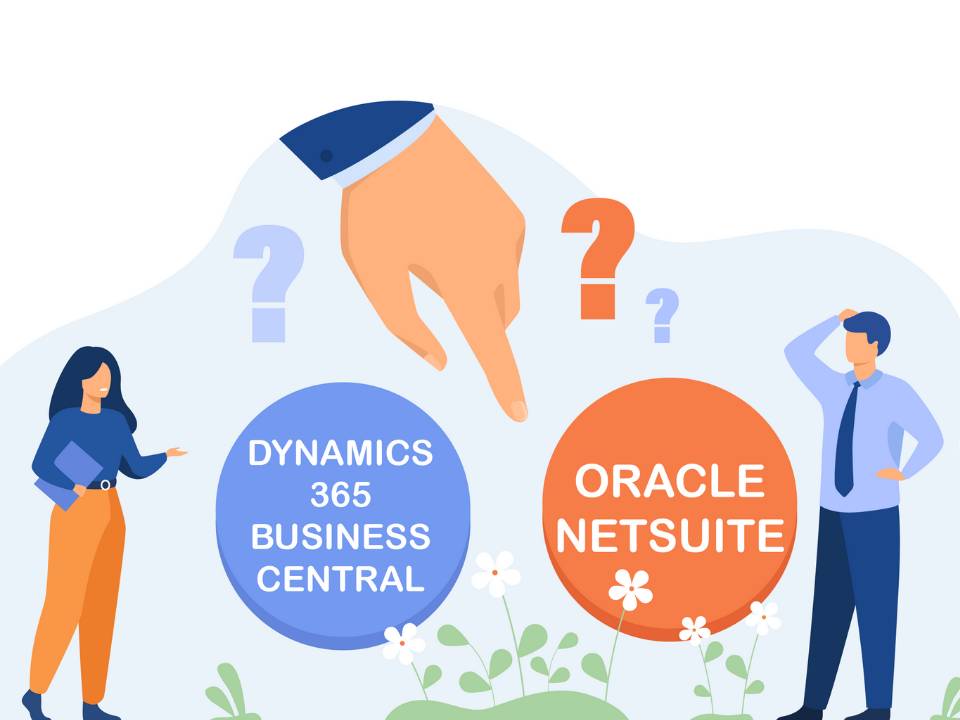Enterprise resource planning (ERP) software manages and integrates your business’s financials, operations, supply chain, reporting, and human resource activities. Most SMBs have a finance and operation system in place, but it lacks all the functions they need in many cases. It also rarely helps with business growth. If you’re looking to invest in an ERP, it pays to compare multiple applications before making a choice.
In this post, we’ll take a look at how Microsoft Dynamics 365 Business Central and Oracle NetSuite stack up against one another. Both cloud-based platforms are designed to help you modernize your present accounting system, but they do differ in several ways.
Dynamics 365 Business Central vs. Oracle NetSuite
Both Dynamics 365 and NetSuite are mature, sophisticated business management programs, making them both reliable ERP choices. They offer similar features and functionality but diverge when it comes to pricing, implementation, and reporting. Let’s take a look.
Microsoft Dynamics 365 Business Central Overview
Microsoft Dynamics 365 Business Central combines CRM and ERP capabilities to give your business up-to-the-minute, accurate sales, financial, and customer service information. When you take advantage of all it has to offer, Dynamics 365 can help you identify and nurture the right leads, close more sales, automate processes, and deliver improved customer experiences.
Oracle NetSuite Overview
Oracle NetSuite allows businesses to run core financial processes using one secure interface. It streamlines operations and utilizes forecasting tools to provide you with customizable KPI views and more.
Business Central and NetSuite Feature Comparison
Now let’s take a look at how the two applications compare with one another in a few basic ways.
Implementation
Business Central can typically be deployed in a couple of weeks. NetSuite implementation, on the other hand, can require extensive customizations that take months.
One of the major advantages of Dynamics 365 is that its interface mirrors that of other Microsoft Office tools users are already familiar with, such as Excel, Word, and Outlook. Its easy-to-navigate, intuitive design translates into less training and quicker employee adoption. NetSuite’s user interface is less intuitive, and users often need extensive training to use the application effectively.
Pricing
NetSuite can be an expensive platform for many SMBs. Multiple customizations add to the bottom line, as does the fact that it’s a 100% cloud solution with no hybrid or on-premise options. And support costs grow with the number of users. Licensing prices aren’t published publicly, but it’s estimated they run somewhere around $1000 a month plus $100 per user per month. Business Central’s licensing is $70 per user per month, with additional add-ons available. Business Central also soundly beats NetSuite on implementation costs.
Reporting
Both solutions offer end-to-end views of business data. Business Central lets users create unlimited parameters for analyzing data, making it easy to drill down quickly to get more in-depth analyses. NetSuite has three dimensions for analyzing data and sometimes requires users to run reports or click through multiple screens to get more details.
Integration
Microsoft Dynamics 365 Business Central easily integrates with different Microsoft tools, including Office 365, Azure, and other Dynamics 365 suite products. Oracle NetSuite lacks native integration with third-party products. Its SuiteCloud Connect is a series of packaged solutions for integrations.
Why Choose Microsoft Dynamics 365 Business Central
While Business Central and Oracle NetSuite are both customizable solutions, Business Central is an enterprise-grade solution that’s less expensive, more intuitive, and seamlessly scales as your business needs grow. Plus, the more you use it, the “smarter” it gets. It’s the perfect combination of sales, servicing, and marketing tools. Dynamics 365 easily meets your company’s unique requirements with its end-to-end support, adapts as your priorities change, and delivers everything your business could want and need in an ERP solution.
